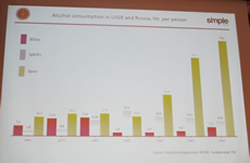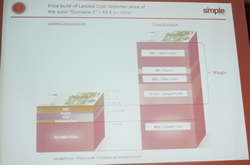 Maxim Kashirin, CEO of Simple Ltd, one of the top three importing companies, founded only in 1994 and his partner Anotoly Korneev shared insights of the wine market in Russia. Surprisingly, wine drinking was very popular till 1985 when the then President Mikhail Gorbachev ordered uprooting of vines and destroyed vineyards in an attempt to control the growing problem of alcoholism, they said. Of course, the consumption of vodka went up tremendously with this retrograde step. Now it’s the beer that has overtaken the fast growing wine. Maxim Kashirin, CEO of Simple Ltd, one of the top three importing companies, founded only in 1994 and his partner Anotoly Korneev shared insights of the wine market in Russia. Surprisingly, wine drinking was very popular till 1985 when the then President Mikhail Gorbachev ordered uprooting of vines and destroyed vineyards in an attempt to control the growing problem of alcoholism, they said. Of course, the consumption of vodka went up tremendously with this retrograde step. Now it’s the beer that has overtaken the fast growing wine.
The taxes are so high (for a typical consignment where 22% of the sales price is the landed cost, 20% is added as the tax component) that it is not practical to sell much of top quality wines in Russia where collectors keep fine wines out of Russia. They have connectivity with the rest of Europe and they buy and store their wines in countries like France and UK. Therefore, one cannot survive by selling top wines. Selling fine wines is really a charity work, according to Maxim.
The wine lists have changed dramatically over the years. Average price of a bottle is around €100. Restaurants charge minimum profits of 300% making them unaffordable (this should ring some bells for us in India). To get an idea of the quality of imported wines, 51% of all imported Italian wines are VdT (Vino di Tavola) with an average ex-cellar price of $ 1.12. 26% are IGT wines at an average of €1.77. Balance is shared by DOC wines averaging €2.06 and DOCG averaging €2.15. Only 0.1% are DOP wines (the new appellation encompassing both DOC and DOCG) with an average of €2.59.
The country lacks in wine culture. There is no wine education or culture to support wine or any legal or professional structure for it. The customers don’t care for ratings and points. Wine Spectator is not translated into Russian and is therefore not popular. Decanter is more about ‘English’ customers. So Russia lacks the knowledge of wines. Interestingly, the import companies start with higher quality products and come down to importing lower quality wines due to high taxes, said the speakers; also a phenomenon observed recently in the Indian wine scenario.
‘Lack of culture is not only for consumers but also companies that are operating in Russia. Till 2-3 years there was a war of discounts. The companies would charge more but go down and offer heavy discounts in most unprofessional way’- a situation rued by many importers and domestic producers in India as well. There is strong competition in a small market with a marked unprofessional behaviour. Finding a right partner is very critical in this market, observed Maxim.
The high taxes in Russia translate about the same as landed cost of the wine including VAT which is slightly over 15%. Where it scores more prominently is the Excise duty which is negligible. Also the retail margins are very high, more than double the landed cost of wines.
Interestingly, in a country with 4% of world consumption, 4.5 million hLs out of a total of 11 million hLs is made by adding sugar to the must in vacuum - apparently, the Russians prefer a touch of sweetness in their wines –like the Indian beginners. Half of the wines are produced from imported must (like Luca wines by Nirvana Biosys). They also import a lot of Argentine unknown bulk wines, we were told.
Unlike India, consumption of sparkling wines is much higher perhaps due to the penchant of Russians to follow the legacy of the erstwhile czars who were very fond of Champagne, especially the  Cristal from Roederer. Ironically, last year a shipment of 10,000 bottles of Cristal was blocked by the government due to a trademark dispute with a domestic vodka manufacturer claiming it sounds very similar to their trade-marked label Kristal. An 8-year battle of trademark has finally gone in favour of the local producer and Cristal has lost the court battle and its trademark rights in Russia. The off-dry Asti Spumante is very popular, though they have yet to make their mark in India. 50% of the wines consumed are sparkling wines in Russia, whereas the Indians imbibe barely 5%. Cristal from Roederer. Ironically, last year a shipment of 10,000 bottles of Cristal was blocked by the government due to a trademark dispute with a domestic vodka manufacturer claiming it sounds very similar to their trade-marked label Kristal. An 8-year battle of trademark has finally gone in favour of the local producer and Cristal has lost the court battle and its trademark rights in Russia. The off-dry Asti Spumante is very popular, though they have yet to make their mark in India. 50% of the wines consumed are sparkling wines in Russia, whereas the Indians imbibe barely 5%.
Russians have still managed to call their brandy Cognac after joining WTO. (The case of Goan Port came to mind instantly). Even in the case of Champagne they have managed to call their domestic sparkling wines Champagne so long as it is written in Russian language. Exports are not allowed under the label of Champagne.
Some of the other points worth noting are:
- Thanks to the complexity of alcoholic beverage marketing, the number of players went down significantly from 2800 to 1800 in 2011
- Sale of alcohol is restricted from 23:00 to 8:00
- Only companies and legal entities are allowed to sell in Retail. Before, individuals were also allowed
- Advertising has always been banned on the federal TV channels. Since July 1, 2012 it has been banned also on the cable TV and public transport
- Advertising of all alcoholic beverages has been banned on the internet since 23 July, 2012. Starting next year they will also be prohibited in the periodic mass media as well
- Wine cannot be sold in the non stationary outlets like kiosks so the public tastings cannot be held at public places except the preview by the licensee at his premises
- Every bottle must carry an excise strip label (akin to our holograms). Earlier, beverages with alcohol content of less than 9% were exempt.
- Payment of excise duty was made on advance payment basis (like in India).
‘Russia was a country in Byzantine culture 1000 years ago and to some extent it is the same even today. It is the worst country in wine consumption,’ said Maxim (he seems to be barely conversant with the Indian market). ‘But the world is changing. People are more demanding, as they are getting closer to European culture - despite the Byzantine culture.’
Wine maker dinners, wine festivals, brand ambassadors, involvement with art projects is their model for wine marketing. Professional companies will survive in the current structure where the government policies are not transparent, said the speakers who despite many in the audience feeling were self aggrandizing, did throw interesting light on a market which till recently, was behind the iron curtain. Apparently, the old charter remains in effect and according to the speakers the development of wine culture in Russia is constrained by the political and social factors.
Subhash Arora
The idea for our heading was inspired by an old, outdated political slogan of the '50s in India coined by the late Prime Minister Jawaharlal Nehru - 'Hindi-Chini bhai bhai'-editor
|